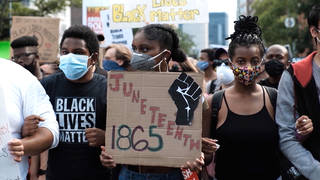
President Joe Biden was elected with massive support from people of color, and in his second week in office he issued four executive orders to advance what the White House calls his “racial equity” agenda. The orders aim to strengthen anti-discrimination policies in housing, end Justice Department contracts with private prison companies, reaffirm sovereignty of Native American tribes and combat xenophobia against Asian Americans and Pacific Islanders. Biden’s racial justice push comes as COVID-19 has devastated communities of color in the U.S., who are experiencing higher rates of infection, death and unemployment during the pandemic. Ash-Lee Woodard Henderson, co-executive director of the Highlander Research and Education Center, says Biden’s executive orders are “a step forward” and credits social movements who have been pressuring the administration to act. “This is not just because of his good graces,” Henderson says. “This is because movement made it possible that racial equity be something that is prioritized in the executive branch of our government.”
